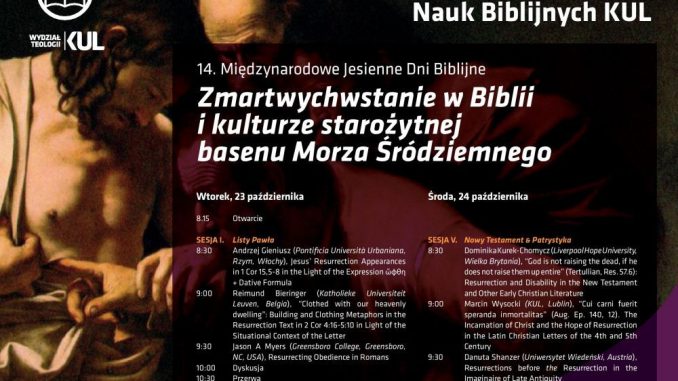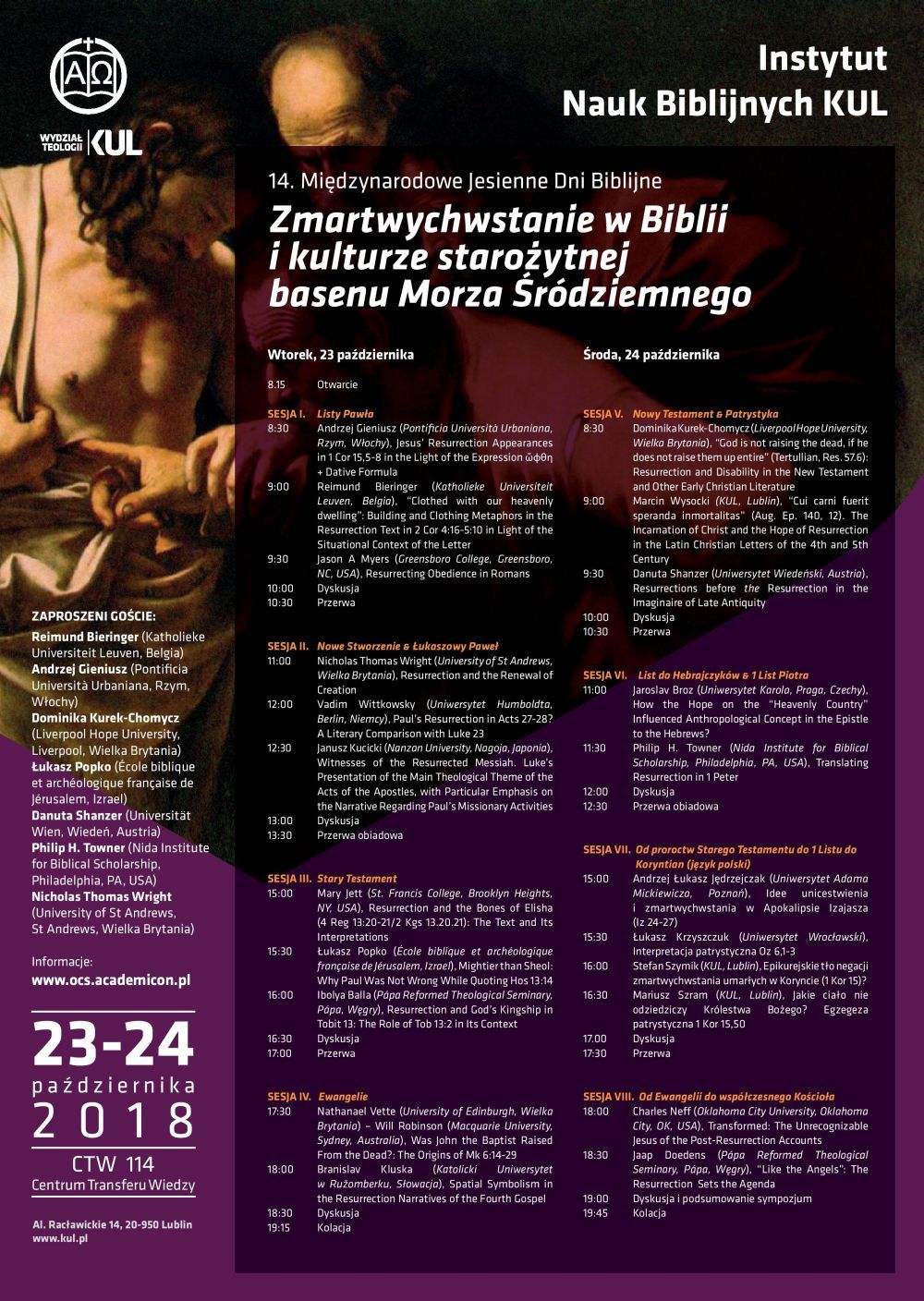
Instytut Nauk Biblijnych KUL zaprasza na Międzynarodowe Jesienne Dni Biblijne, które odbędą się 23-24 października 2018 w Centrum Transferu Wiedzy, sala CTW-114. Tematem sympozjum będzie zmartwychwstanie w Biblii oraz tradycjach pozabiblijnych.
Obszar kultury śródziemnomorskiej, w której badać będziemy fenomen i ideę zmartwychwstania, obejmuje starożytny Egipt, Mezopotamię, Izrael, Grecję oraz Rzym. Interesują nas aspekty historyczne, antropologiczno-kulturowe, teologiczne jak również analiza konkretnych tekstów mówiących o zmartwychwstaniu. Będziemy szukać odpowiedzi na pytania o kształt i charakter idei zmartwychwstania w tekstach i tradycjach pozabiblijnych, genezę i formę idei zmartwychwstania w starożytnym Izraelu, historyczność, szczególny charakter i status zmartwychwstania Chrystusa oraz jego wpływ na kształtowanie się teologii, moralności, eschatologii oraz eklezjologii chrześcijańskiej.
Zaproszeni goście:
Reimund Bieringer (Katholieke Universiteit Leuven, Belgia)
Andrzej Gieniusz (Pontificia Università Urbaniana, Rzym, Włochy)
Dominika Kurek-Chomycz (Liverpool Hope University, Liverpool, Wielka Brytania)
Łukasz Popko (École biblique et archéologique française de Jérusalem, Izrael)
Danuta Shanzer (Universität Wien, Wiedeń, Austria)
Philip H. Towner (Nida Institute for Biblical Scholarship, Philadelphia, PA, USA)
Nicholas Thomas Wright (University of St Andrews, St Andrews, Wielka Brytania)
PROGRAM KONFERENCJI
Wtorek, 23 października
8.15 Otwarcie
Sesja I. Listy Pawła
8.30 – Andrzej Gieniusz (Pontificia Università Urbaniana, Rzym, Włochy), Jesus’ Resurrection Appearances in 1 Cor 15,5-8 in the Light of the Expression ὤφθη + Dative Formula
9.00 – Reimund Bieringer (Katholieke Universiteit Leuven, Belgia), “Clothed with our heavenly dwelling”: Building and Clothing Metaphors in the Resurrection Text in 2 Cor 4:16-5:10 in Light of the Situational Context of the Letter
9.30 – Jason A Myers (Greensboro College, Greensboro, NC, USA), Resurrecting Obedience in Romans
10.00 – Dyskusja
10.30 – Przerwa
Sesja II. Nowe Stworzenie & Łukaszowy Paweł
11.00 – Nicholas Thomas Wright (University of St Andrews, Wielka Brytania), Resurrection and the Renewal of Creation
12.00 – Vadim Wittkowsky (Uniwersytet Humboldta, Berlin, Niemcy), Paul’s Resurrection in Acts 27-28? A literary comparison with Luke 23
12.30 – Janusz Kucicki (Nanzan University, Nagoja, Japonia), Witnesses of the Resurrected Messiah. Luke’s Presentation of the Main Theological Theme of the Acts of the Apostles, with Particular Emphasis on the Narrative Regarding Paul’s Missionary Activities
13.00 – Dyskusja
13.30 – Przerwa obiadowa
Sesja III. Stary Testament
15.00 – Mary Jett (St. Francis College, Brooklyn Heights, NY, USA), Resurrection and the Bones of Elisha (4 Reg 13:20-21/2 Kgs 13.20.21): The Text and Its Interpretations
15.30 – Łukasz Popko (École biblique et archéologique française de Jérusalem, Izrael), Mightier than Sheol: Why Paul Was Not Wrong While Quoting Hos 13:14
16.00 – Ibolya Balla (Pápa Reformed Theological Seminary, Pápa, Węgry), Resurrection and God’s Kingship in Tobit 13: The role of Tob 13:2 in its Context
16.30 – Dyskusja
17.00 – Przerwa
Sesja IV. Ewangelie
17.30 – Nathanael Vette (University of Edinburgh, Wielka Brytania) – Will Robinson (Macquarie University, Sydney, Australia), Was John the Baptist Raised From the Dead?: The Origins of Mk 6:14-29
18.00 – Branislav Kluska (Katolicki Uniwersytet w Ružomberku, Słowacja), Spatial Symbolism in the Resurrection Narratives of the Fourth Gospel
18.30 – Dyskusja
19.15 – Kolacja
Dzień 2 (środa, 24 października)
Sesja V. Nowy Testament & Patrystyka
8.30 – Dominika Kurek-Chomycz (Liverpool Hope University, Wielka Brytania), “God is not raising the dead, if he does not raise them up entire” (Tertullian, Res. 57.6): Resurrection and Disability in the New Testament and Other Early Christian Literature
9.00 – Marcin Wysocki (KUL, Lublin), “Cui carni fuerit speranda inmortalitas” (Aug. Ep. 140, 12). The Incarnation of Christ and the Hope of Resurrection in the Latin Christian Letters of the 4th and 5th Century
9.30 – Danuta Shanzer (Uniwersytet Wiedeński, Austria), Resurrections before the Resurrection in the Imaginaire of Late Antiquity
10.00 – Dyskusja
10.30 – Przerwa
Sesja VI. List do Hebrajczyków & 1 List Piotra
11.00 – Jaroslav Broz (Uniwersytet Karola, Praga, Czechy), How the Hope on the “Heavenly Country” Influenced Anthropological Concept in the Epistle to the Hebrews?
11.30 – Philip H. Towner (Nida Institute for Biblical Scholarship, Philadelphia, PA, USA), Translating Resurrection in 1 Peter
12.00 – Dyskusja
12.30 – Przerwa obiadowa
Sesja VII. Od proroctw Starego Testamentu do 1 Listu do Koryntian (język polski)
15.00 – Andrzej Łukasz Jędrzejczak (Uniwersytet Adama Mickiewicza, Poznań), Idee unicestwienia i zmartwychwstania w Apokalipsie Izajasza (Iz 24-27)
15.30 – Łukasz Krzyszczuk (Uniwersytet Wrocławski), Interpretacja patrystyczna Oz 6,1-3
16.00 – Stefan Szymik (KUL, Lublin), Epikurejskie tło negacji zmartwychwstania umarłych w Koryncie (1 Kor 15)?
16.30 – Mariusz Szram (KUL, Lublin), Jakie ciało nie odziedziczy Królestwa Bożego? Egzegeza patrystyczna 1 Kor 15,50
17.00 – Dyskusja
17.30 – Przerwa
Sesja VIII. Od Ewangelii do współczesnego Kościoła
18.00 – Charles Neff (Oklahoma City University, Oklahoma City, OK, USA), Transformed: The Unrecognizable Jesus of the Post-Resurrection Accounts
18.30 – Jaap Doedens (Pápa Reformed Theological Seminary, Pápa, Węgry), “Like the Angels”: The Resurrection Sets the Agenda
19.00 – Dyskusja i podsumowanie sympozjum
19.45 – Kolacja


